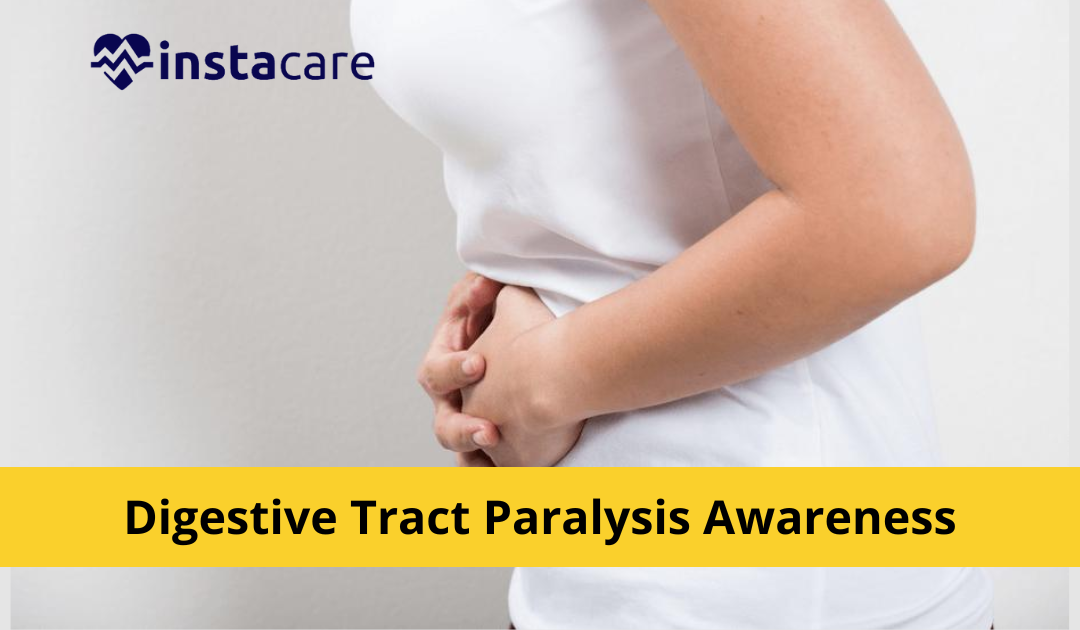Digestive System Paralysis (DTP) is a catch-all name for any paralytic disorder of the digestive tract. This paralysis is similar to another organ paralysis in which the body's capacity to transfer food through the digestive tract is impaired. The contents of a typical stomach are discharged into the small intestines at an acceptable rate. However, the muscular contractions that carry food through the digestive tract do not work correctly in gastroparesis. As a result, the stomach empties too slowly. This is often referred to as delayed gastric emptying. In rare circumstances, the disease is fatal, mainly if overlooked or untreated. If left untreated, blood sugar fluctuations and nutritional shortages may ensue.
Causes Of Digestive Tract Paralysis
Digestive tract paralysis awareness also includes the causes of which people are aware. The etiology of gastroparesis is not always evident. However, it can sometimes be caused by injury to a nerve that controls the stomach muscles (vagus nerve). The vagus nerve aids in the management of complicated processes in your digestive tract, such as directing stomach muscles to contract and push food into the small intestine. A damaged vagus nerve prevents proper signal transmission to your stomach muscles. Food may linger in your stomach longer rather than moving into your small intestine to be digested as a result of this. Diseases such as diabetes and surgery to the stomach or small intestine can harm the vagus nerve and its branches. Factors that might raise your risk of gastroparesis include
Symptoms And Signs About Digestive Tract Paralysis Awareness
Gastroparesis is a disorder that disrupts the natural, spontaneous movement of your stomach muscles (motility). Typically, vigorous muscle contractions move food through your digestive tract. However, if you have gastroparesis, your stomach motility is sluggish or non-existent, preventing your stomach from emptying normally. Among the signs and symptoms of gastroparesis is:
- Reflux of acid
- Vomiting
- Nausea
- Appetite loss
- Bloating in the abdomen
- Vomiting undigested food consumed a few hours before
- Pain in the abdomen
- Blood sugar fluctuations
- Malnutrition and weight loss
- A sense of fullness after only a few nibbles
Treatment And Diagnosis
A stomach or duodenal manometry, abdominal scan, and gastric emptying will be conducted to identify the disorder. Following a diagnosis, the appropriate therapy will be recommended. In addition to a diet adjustment, some drugs may be prescribed. Certain meals may assist in alleviating the symptoms.
View More: Children Eye Health And Safety Month
Complications
- Food that has not been digested becomes hard and remains in your stomach. Undigested gut food can conge into a solid mass known as a bezoar. Bezoars can cause nausea and vomiting and can be deadly if they obstruct food passage into the small intestine.
- Malnutrition. A lack of appetite may indicate that you are not consuming enough calories or that you cannot absorb enough nutrients owing to vomiting.
- Dehydration is extreme. Dehydration might occur if vomiting continues.
- Reduced quality of life. Work and other tasks might be made more difficult by symptoms.
- Unpredictable blood sugar fluctuations Although gastroparesis does not cause diabetes. It can produce irregular variations in blood sugar levels due to frequent changes in the rate and volume of food moving into the small bowel. These blood sugar fluctuations aggravate diabetes. As a result, poor blood sugar regulation exacerbates gastroparesis.
Conclusion
There is no treatment available. Because little is known about the condition's etiology, Digestive Tract Paralysis (DTP) Awareness Month is critical. To overcome and find a solution to the stomach illness, the medical community seeks to increase awareness, generate funding, educate the public, and assist patients and their families.
Please book an appointment with the Best Gastroenterologist in Lahore, Karachi, Islamabad, and all major cities of Pakistan through InstaCare, or call our helpline at 03100002273 to find the verified doctor for your disease.
Source: https://instacare.pk/blog/august-is-digestive-tract-paralysis-awareness-month-instacare







